Rugby Union has long had a prominent, if not undisputed place in New Zealand culture.
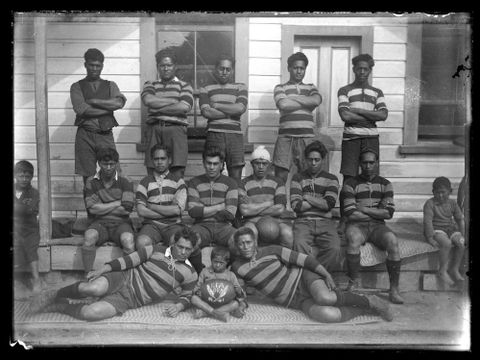
New Zealanders had warmly welcomed the Springboks in 1956. South Africa’s national policy of apartheid, introduced in 1948, was not an obstacle to the tour, even though this meant the team was selected according to race and ‘Blacks’ were excluded.
However, over the 1960s and 1970s, contact with racially segregated South Africa grew to be an issue of national and international concern. In New Zealand, concern was raised because apartheid meant that Maori were excluded from the All Blacks team that went to South Africa in 1960. This led to a petition and the challenge: ‘No Maoris – No Tour’. In 1970 a compromise was reached: Maori were permitted to tour South Africa in the All Blacks as ‘honorary whites’.
The issue of sporting contacts with South Africa came to a very public head after the All Blacks played in South Africa in 1976. Amongst those condemning this action were a large number of African nations who boycotted the Montreal Olympics because of New Zealand’s attendance.
Over the 1960s and 70s, some sections of society began protesting in public about social issues, especially those related to civil and human rights, social inequality and injustice. New Zealand was caught up in this international movement, which also influenced the actions of those opposed to the 1981 Springbok tour of New Zealand.
At the heart of the debate was whether sports and politics were or could be independent. Supporters of the tour were adamant that they were and had to be. Opponents insisted that by receiving the white-only Springboks, New Zealand was supporting South Africa’s racist regime and condoning its abuse of civil and human rights.
During the Springboks’ 56-day tour, over 150,000 people participated in more than 200 demonstrations; 1500 were charged with protest-related offences. Special police squads, which attracted controversy, were established to protect the teams and to maintain law and order.
Games in Hamilton and Timaru were cancelled. In Hamilton, this was because anti-tour protestors occupied the field, shown in the photograph above. (The cross they are carrying is currently on display at Te Papa in the exhibition, Slice of Heaven: 20th Century Aotearoa.
Find out more about this divisive event on nzhistory.net.nz
See images and objects in Te Papa’s collections related to rugby (including the 1981 Springbok tour)
Read about social protests in New Zealand, including those that occurred in 1981, featured in Slice of Heaven: 20th Century Aotearoa
Curator Modern New Zealand

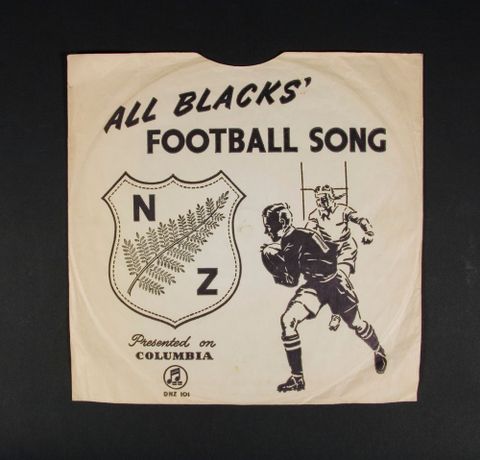 Record, ’All Blacks’ Football Song’, 1956, His Master’s Voice (N.Z.) Ltd. Columbia Records, Gregory, P.W. Woolston Brass Band, New Zealand. Purchased, 2010. Te Papa
Record, ’All Blacks’ Football Song’, 1956, His Master’s Voice (N.Z.) Ltd. Columbia Records, Gregory, P.W. Woolston Brass Band, New Zealand. Purchased, 2010. Te Papa Rugby ball, 1956, Watts Sports Depot Limited (1935–1959), New Zealand. Purchased 2007. Te Papa
Rugby ball, 1956, Watts Sports Depot Limited (1935–1959), New Zealand. Purchased 2007. Te Papa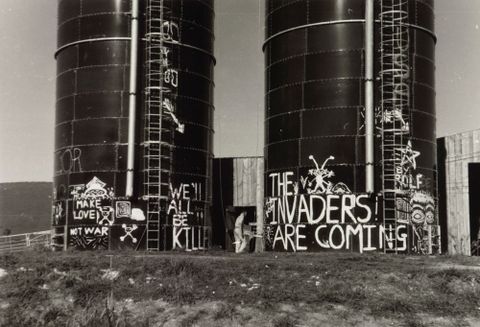 Peace slogans on power plant tanks, Bay of Plenty, 1960s, Lee-Johnson, Eric (1908–1993), Bay of Plenty. Purchased 1997 with New Zealand Lottery Grants Board funds. © Te Papa. Te Papa
Peace slogans on power plant tanks, Bay of Plenty, 1960s, Lee-Johnson, Eric (1908–1993), Bay of Plenty. Purchased 1997 with New Zealand Lottery Grants Board funds. © Te Papa. Te Papa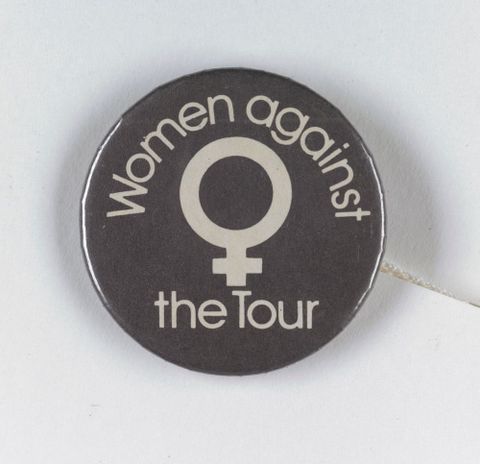 Badge, ‘Women against the Tour’, 1981, Maker unknown, New Zealand. Gift of Annette Anderson, 2009. Te Papa
Badge, ‘Women against the Tour’, 1981, Maker unknown, New Zealand. Gift of Annette Anderson, 2009. Te Papa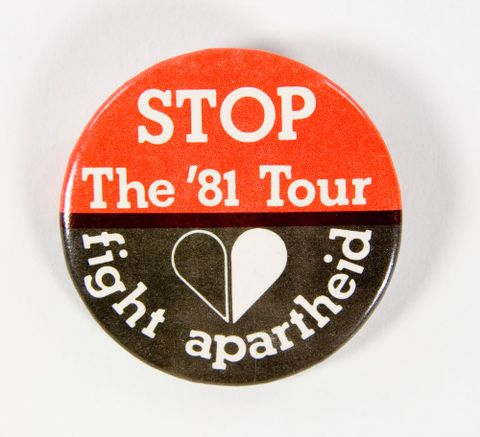 Badge, ’STOP The ’81 Tour’, 1981, HART (Halt All Racist Tours) (1969–1992), New Zealand. Gift of Annette Anderson, 2009. Te Papa
Badge, ’STOP The ’81 Tour’, 1981, HART (Halt All Racist Tours) (1969–1992), New Zealand. Gift of Annette Anderson, 2009. Te Papa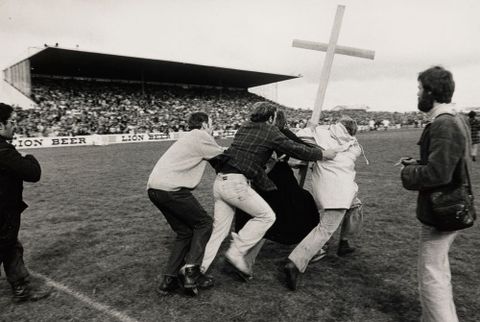 Two members of St John’s College run onto Rugby Park, Hamilton, while two supporters of Springbok Rugby Tour try to stop them, 1981, 1981, Black, Peter (1948– ), Waikato. Purchased 1983 with New Zealand Lottery Board funds. Te Papa
Two members of St John’s College run onto Rugby Park, Hamilton, while two supporters of Springbok Rugby Tour try to stop them, 1981, 1981, Black, Peter (1948– ), Waikato. Purchased 1983 with New Zealand Lottery Board funds. Te Papa
Certainly PW Gregory wrote the “All Blacks football song” but it was arranged by Dennis Wright.
Whether he was a member of the Woolston Brass band, I do not know !
However a most interesting resume.